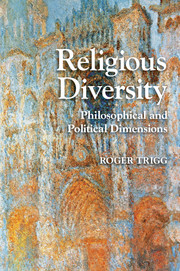Book contents
- Frontmatter
- Dedication
- Contents
- Introduction
- 1 The Challenge of Religious Diversity
- 2 Do Religions Claim Truth?
- 3 Religious Pluralism
- 4 The Roots of Religious Belief
- 5 Does Disagreement Undermine Theism?
- 6 Education and Religious Diversity
- 7 Truth and Coercion
- 8 Religious Diversity and Identity
- 9 Religion as Personal Preference
- 10 Freedom and Religion
- Bibliography
- Index
- References
7 - Truth and Coercion
Published online by Cambridge University Press: 05 June 2014
- Frontmatter
- Dedication
- Contents
- Introduction
- 1 The Challenge of Religious Diversity
- 2 Do Religions Claim Truth?
- 3 Religious Pluralism
- 4 The Roots of Religious Belief
- 5 Does Disagreement Undermine Theism?
- 6 Education and Religious Diversity
- 7 Truth and Coercion
- 8 Religious Diversity and Identity
- 9 Religion as Personal Preference
- 10 Freedom and Religion
- Bibliography
- Index
- References
Summary
INTOLERANCE OR HUMILITY?
Many find it threatening that religions can make “objective” claims to truth that apply universally. This may be because the alleged truth in question is not just of marginal importance, or of interest to a few specialists. By definition, it could concern all humanity, and the place of humans in the scheme of things. If, in addition, the religion concerned considers that recognizing such truth appears important for the eternal destiny of each person, it might follow that everyone should be informed of this, so as to have a chance of living in accordance with that truth. There could appear to be a positive duty of proselytizing.
Christianity and Islam both believe they have a universal message. If there is one God, one would expect that He would be regarded as the God of all people, and not just some. Even in the Old Testament, the God of Israel is also often seen as the God of the whole world, so that one day “all nations” will acknowledge Him. The universalist message is muted, however, in comparison with the deliberate offering of the Christian message to Gentiles as well as Jews in the New Testament.
- Type
- Chapter
- Information
- Religious DiversityPhilosophical and Political Dimensions, pp. 114 - 131Publisher: Cambridge University PressPrint publication year: 2014

